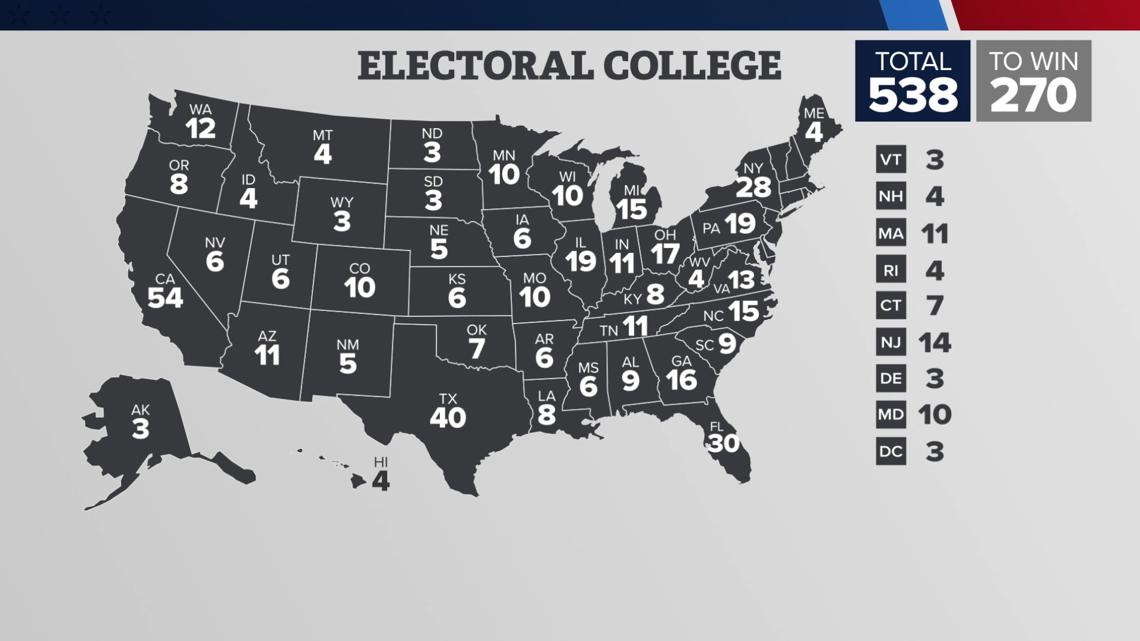[ad_1]
As Election Day gets closer, we’ve got you covered with the answers to some of the top questions about the presidential election, the Electoral College and results.
WASHINGTON — Election Day and the end of the 2024 presidential campaign is coming up fast.
By the time Tuesday, Nov. 5 arrives, millions of people will have already submitted their ballots to help decide federal, state and local races.
We’ve got you covered with the answers to some of the top questions surrounding the presidential election, Election Day and the wait for results.
Presidential Election 2024: Answering top questions
How many electoral votes does each state get?
Each state gets as many electors as it has members of Congress. Washington, D.C. also has three Electoral College votes. There are 538 electoral votes up for grabs and in order to win the presidency, Vice President Harris or former President Donald Trump has to secure 270 of them.
California, the most populous state, has 54 electoral votes. Texas has the second-most with 40 electoral votes. After that, Florida has 30 votes, and New York has 28. Then, it goes to Pennsylvania and Illinois with 19 each.


What happened with the Electoral College in 2020?
President Joe Biden won the 2020 election with 306 Electoral College votes to Trump’s 232 votes.
RELATED LINK: What happened during the 2020 presidential election?
When is the voter registration deadline?
Every state, except North Dakota, requires people to register to vote before casting a ballot. But the deadlines can vary greatly.
About 20 states allow you to register on Election Day and then immediately cast a ballot. The rest of the states require advance registration, with the deadlines ranging from three to 30 days before an election. You can see the deadline to register in all 50 states by clicking our guide here.
RELATED LINK: Here’s the voter registration deadline in each state
When does early voting start?
For the upcoming November election, 47 states and the District of Columbia offer early voting options, according to the National Conference of State Legislatures. Only three states — Alabama, Mississippi and New Hampshire — do not offer early in-person voting. However, some of these states may still have alternative options for eligible absentee voters.
You can click here to see our full state-by-state breakdown of when early voting starts.
RELATED LINK: When does early voting start? A state-by-state breakdown
Who can vote in the November election?
The 26th Amendment to the Constitution sets the voting age at 18. You must be at least that old by Election Day, which this year is Nov. 5.
A 1996 U.S. law makes it illegal for noncitizens to vote in elections for president or members of Congress. Some municipalities in California, Maryland and Vermont, as well as the District of Columbia, do allow voting by noncitizens in some local elections such as for school board and city council.
RELATED LINK: Election Day is coming up. Here’s who can vote and what to do if you want to cast a ballot
What’s open and closed on Election Day 2024?
Most businesses will remain open on Election Day as it isn’t a federal holiday. Some, however, have adjusted hours or given employees time off in order to boost voter participation. Banks, such as Wells Fargo, Bank of America, TD Bank and Regions Bank, should not see any changes in their operating hours on Tuesday.
The U.S. Postal Service will deliver mail Tuesday, according to its holiday schedule.
When will we know who won the presidential election?
After polls close on election night, attention shifts to The Associated Press and the major TV networks to report the results and announce who will be the next president.
Some years, that official race call has come within hours of the first polls closing. But in recent years, it’s taken longer to know for sure which candidate has won enough electoral votes to win the White House. With such a close election, it’s very likely we won’t know the next president on Election Day.
Have more election questions? Visit these additional stories
[ad_2]
Source link




